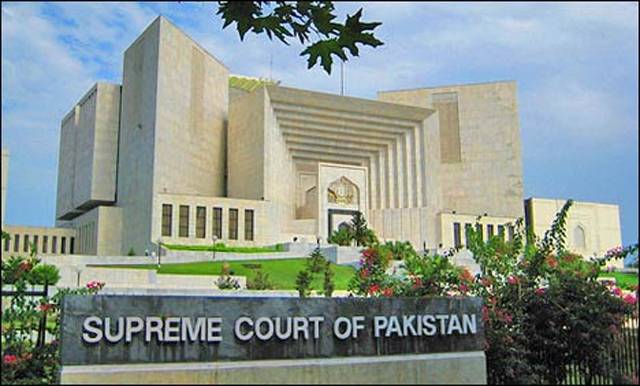ISLAMABAD - The Supreme Court on Wednesday held that the appointment of judges through Judicial Commission of Pakistan and its rules are constitutionally valid.
A three-member bench, headed by Justice Asif Saeed Khan Khosa, heard the appeal of Lawyers Foundation for Justice against the Lahore High Court verdict.
The petitioner has challenged the selection policy for the appointment of the high courts’ judges devised by the JCP. He maintained that the judges in the High Courts should be made through competitive exams, as thousands of lawyers, who are qualified and meet the requirements are not given opportunity to become lawyers.
The petitioner stated that it is the fundamental right of all lawyers, who qualified under Article 193(2)(a) of Constitution having practiced as advocates of high court for not less than 10 years be considered for appointment as judges of High Courts.
The Lawyers Foundation demanded that the process of appointment of judges in high courts must be transparent and open to the public view under Article 19A of Constitution. It said the colonial tradition of judges’ appointment gives rise to favouritism, nepotism and politicizes the judicial system in the country.
During the proceeding, Justice Dost Muhammad Khan, another member of the bench, said earlier the authority for the appointment of high court judges vested with the Chief Justices but now it is done through JCP. He said the JCP comprises Chief Justice of Pakistan, four senior judges of the apex court, Attorney General for Pakistan, Minister of Law and Justice and the representative of Pakistan Bar Council.
The judge further said the name for appointment of high court judge is approved after considering the reports of ISI, IB, Income Tax and Property Tax departments. He said judge is not an ordinary position that is filled through competitive exams.
The court noted that the JCP rules have been framed under the mandate of clause 4 of Article 175A of 1973 Constitution. The bench said that the vires and the validity of the Article 175A have been upheld by the apex court and even the JCP rules have been examined by the Supreme Court, and it had been categorically upheld that the JCP rules 2010 are not repugnant to the constitution and have been enforced by the authorities.
The court observed that if the apex court has authoritatively upheld the validity of the Judicial Commission and its rules then the petitioner can’t agitate them in the present case. The court, therefore, dismissed the petition.
Advocate Syed Asghar Ali Shah, another petitioner, also sought review of ‘impugned selection policy [of judges appointment]’, but he failed to refer to any the policy. He repeatedly said the practice nomination of persons for appointment of judges by the Chief Justice of Pakistan and Chief Justices of High Court needed improvement.
The Lawyers Foundation for Justice has also urged the court that Article 175A of Constitution should not be read in isolation but it is to be interpreted along with Article 2A, 9, 18 and 25. He said Rule 3(ii) of the Judicial Commission is ultra vires to the ‘equality of treatment,’ under Article 25 and principle of ‘equality of opportunity’ enshrined in Article 2A of the constitution.
It said arbitrary nomination through choice without any system of selection is not only illegal and unconstitutional but also unethical and un-Islamic. He argued that the colonial masters, the Englishmen, in their own country have been appointing judges through inviting application throughout the country for the last 900 years, while left behind tradition of appointment through choice in the sub-continent. It said according to the recent Reforms Act 2005 the posts of High Court judges for England and Wales are advertised through newspapers.






